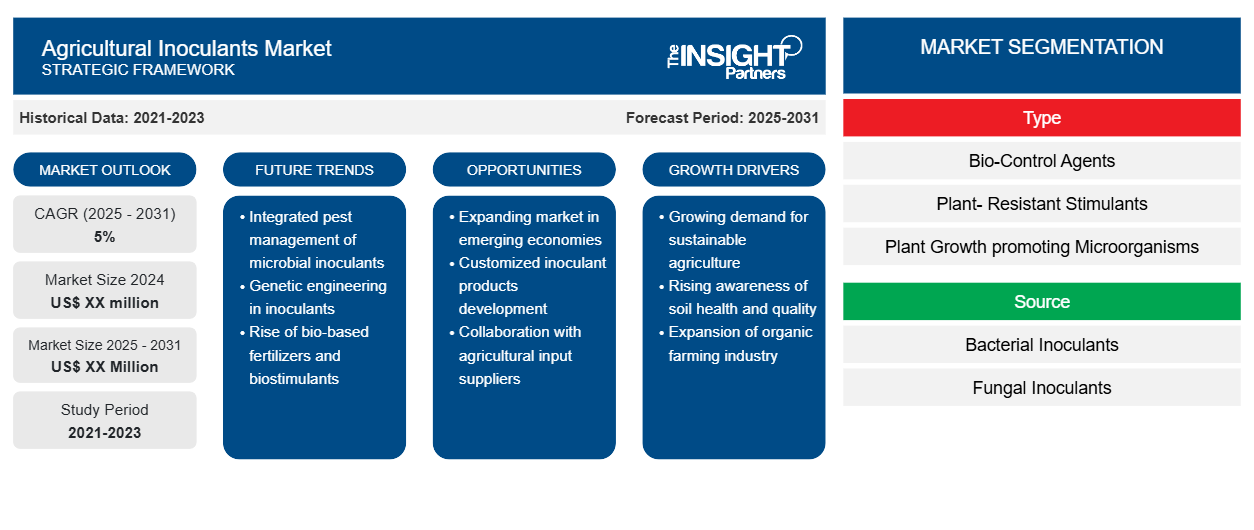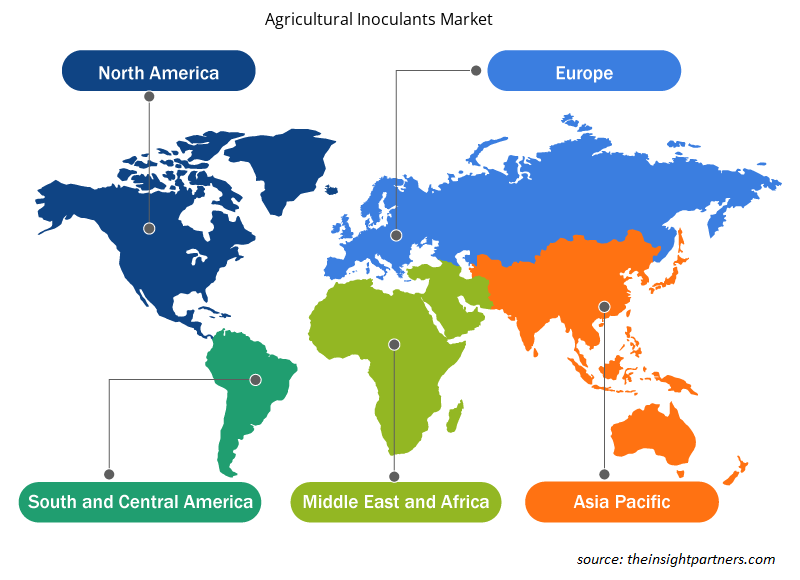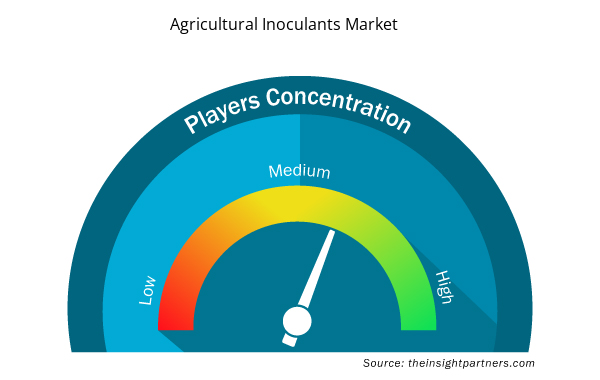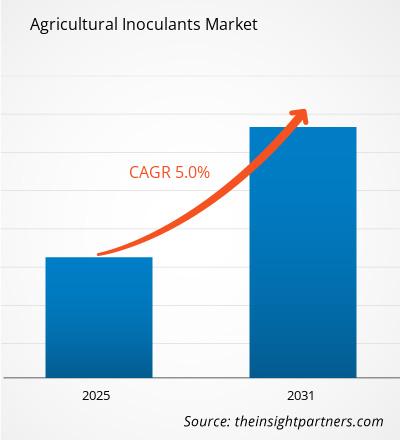The Agricultural Inoculants Market is expected to register a CAGR of 5% from 2025 to 2031, with a market size expanding from US$ XX million in 2024 to US$ XX Million by 2031.
The report is segmented by type (Bio-Control Agents, Plant- Resistant Stimulants, Plant Growth promoting Microorganisms). The global analysis is further broken-down at regional level and major countries. The report offers the value in USD for the above analysis and segments. Bio-control agents are organisms used to control pests, weeds, or plant diseases in agriculture and ecosystems. These natural enemies include predators, parasites, pathogens, and competitors that target specific harmful species. The report provides key statistics on the market status of the key market players and offers market trends and opportunities.
Purpose of the Report
The report Agricultural Inoculants Market by The Insight Partners aims to describe the present landscape and future growth, top driving factors, challenges, and opportunities. This will provide insights to various business stakeholders, such as:
- Technology Providers/Manufacturers: To understand the evolving market dynamics and know the potential growth opportunities, enabling them to make informed strategic decisions.
- Investors: To conduct a comprehensive trend analysis regarding the market growth rate, market financial projections, and opportunities that exist across the value chain.
- Regulatory bodies: To regulate policies and police activities in the market with the aim of minimizing abuse, preserving investor trust and confidence, and upholding the integrity and stability of the market.
Agricultural Inoculants Market Segmentation
Type
- Bio-Control Agents
- Plant- Resistant Stimulants
- Plant Growth promoting Microorganisms
Source
- Bacterial Inoculants
- Fungal Inoculants
Form
- Solid
- Liquid
- Granular
Crop Type
- Food Crops
- Cash Crops
- Plantation Crops
- Fruits and Vegetables
Customize This Report To Suit Your Requirement
You will get customization on any report - free of charge - including parts of this report, or country-level analysis, Excel Data pack, as well as avail great offers and discounts for start-ups & universities
Agricultural Inoculants Market: Strategic Insights

- Get Top Key Market Trends of this report.This FREE sample will include data analysis, ranging from market trends to estimates and forecasts.
Agricultural Inoculants Market Growth Drivers
- Growing demand for sustainable agriculture: Sustainable trends in agriculture significantly propel the agricultural inoculants market. There is an increasing shift to environmentally friendly farming practices as global environmental awareness grows. Farmers and agricultural businesses are therefore looking for alternatives to chemicals-intensive methods; hence agricultural inoculants provide a sustainable option.
- Rising awareness of soil health and quality: Another main driver behind this is the rising understanding of soil health and its vital importance in agriculture. A prevailing understanding is that soil is not merely a place where crops grow but also an intricate community filled with friendly microorganisms.
- Expansion of organic farming industry: The quick expansion of the organic farming industry is propelling growth in the agricultural inoculants market. This is because organic agriculture bans the use of synthetic fertilizers and pesticides, thus, making it become necessary to utilize biological alternatives such as inoculants. Inoculants are used extensively in organic farming on legumes (using rhizobia), mycorrhizal fungi for diverse crops so as to enhance how plants absorb essential nutrients and improve their health.
Agricultural Inoculants Market Future Trends
- Integrated pest management of microbial inoculants: The coming years for the agricultural inoculants market will mostly be dominated by integrating microbial inoculants into IPM based approaches. Farmers have been searching for other different ways of managing pests and diseases without maximum dependence on chemical pesticides. Biological inoculants such as good bacteria and fungi do reduce the pests and increase plant health while minimizing the inputs of synthetic chemicals. The more IPM grows in popularity as an environment-friendly method, the more agricultural inoculants shall make a significant contribution to pest control.
- Genetic engineering in inoculants: The most notable future trend in agricultural inoculants is the production of genetically engineered or custom-designed microbial products. Thus, developments in biotechnology now afford the manipulation of microorganisms with better efficacy, resistance, or ability to carry out specific functions, such as nutrient fixation, disease resistance, or stress tolerance by the genetically engineered inoculants that expect to be highly specific and effective in most of their applications. Ultimately, such innovations will attract the high interest of the market in providing farmers better tools for efficiently improving crop productivity.
- Rise of bio-based fertilizers and biostimulants: There is an increasing shift towards the more appropriate use of bio-based fertilizers and biostimulants in the increasingly environment friendly changes in agriculture. Examples of such products include microbial inoculants, amino acids, and other natural substances. They are designed to improve soil fertility and plant growth. Among these bio-based products, agricultural inoculants are increasingly being used for improving soil fertility and plant growth, for increasing nutrient uptake, stimulating plant growth, and increasing resistance to stress. Use of biostimulants coupled with bio-based fertilizers will continue to play a major role in the evolution of the agricultural inoculants market, which has been driven majorly by consumer preference for organic and sustainably grown food.
Agricultural Inoculants Market Opportunities
- Expanding market in emerging economies: In developing nations, there is considerable opportunity for progress in economic or social terms; especially in South Asia, Africa and some South American territories where agriculture stands out. Agricultural inoculants can help in reinstating land that has been tainted by industrial waste, excessive application of pesticides or salt contamination. A particular area that has an opening for microbial inoculants meant for degrading contaminants or enhancing soil structure on degraded lands is an important one. As more and more scientists turn its attention to carbon capturing and storing as a means of curbing global warming, soil carbon sequestration is attracting new levels of interest.
- Customized inoculant products development: The cultivation of custom inoculant products will be led into the future by the demand towards tailor-made solutions in agriculture. Farmers are searching for inoculants solely dealing with their specific type of soil conditions, coupled with their crops and regional climate. This represents an opportunity for companies to develop inoculants that are targeted and personalized to meet unique requirements by farmers. Advances in biotechnology, genetic engineering, and microbiome research-all will be able to yield highly specific inoculants under optimal growth returns, based on various agricultural conditions.
- Collaboration with agricultural input suppliers: Such traditional input suppliers are fertilizer and pesticide manufacturers. Thus, this forms an opportunity for agricultural inoculant companies to collaborate with such traditional input suppliers. Cooperative marketing will allow inoculant producers to expand their distributors through the existing input commodity outlier. For instance, this is achieved through the incorporation of microbial inoculants within normal fertilizer or biostimulant products so that comprehensive, green soil health and improved nutrient efficiency will be offered with environmental downsizing. These partnerships will enable inoculant companies to penetrate new customer bases while strengthening their market presence.
Agricultural Inoculants Market Regional Insights
The regional trends and factors influencing the Agricultural Inoculants Market throughout the forecast period have been thoroughly explained by the analysts at Insight Partners. This section also discusses Agricultural Inoculants Market segments and geography across North America, Europe, Asia Pacific, Middle East and Africa, and South and Central America.

- Get the Regional Specific Data for Agricultural Inoculants Market
Agricultural Inoculants Market Report Scope
| Report Attribute | Details |
|---|---|
| Market size in 2024 | US$ XX million |
| Market Size by 2031 | US$ XX Million |
| Global CAGR (2025 - 2031) | 5% |
| Historical Data | 2021-2023 |
| Forecast period | 2025-2031 |
| Segments Covered |
By Type
|
| Regions and Countries Covered | North America
|
| Market leaders and key company profiles |
Agricultural Inoculants Market Players Density: Understanding Its Impact on Business Dynamics
The Agricultural Inoculants Market market is growing rapidly, driven by increasing end-user demand due to factors such as evolving consumer preferences, technological advancements, and greater awareness of the product's benefits. As demand rises, businesses are expanding their offerings, innovating to meet consumer needs, and capitalizing on emerging trends, which further fuels market growth.
Market players density refers to the distribution of firms or companies operating within a particular market or industry. It indicates how many competitors (market players) are present in a given market space relative to its size or total market value.
Major Companies operating in the Agricultural Inoculants Market are:
- Advanced Biological Marketing Inc.
- BASF SE
- Bayer Crop Science Ltd.
- E. I. Dupont De Nemours and Company
- Horticultural Alliance Inc.
Disclaimer: The companies listed above are not ranked in any particular order.

- Get the Agricultural Inoculants Market top key players overview
Key Selling Points
- Comprehensive Coverage: The report comprehensively covers the analysis of products, services, types, and end users of the Agricultural Inoculants Market, providing a holistic landscape.
- Expert Analysis: The report is compiled based on the in-depth understanding of industry experts and analysts.
- Up-to-date Information: The report assures business relevance due to its coverage of recent information and data trends.
- Customization Options: This report can be customized to cater to specific client requirements and suit the business strategies aptly.
The research report on the Agricultural Inoculants Market can, therefore, help spearhead the trail of decoding and understanding the industry scenario and growth prospects. Although there can be a few valid concerns, the overall benefits of this report tend to outweigh the disadvantages.
- Historical Analysis (2 Years), Base Year, Forecast (7 Years) with CAGR
- PEST and SWOT Analysis
- Market Size Value / Volume - Global, Regional, Country
- Industry and Competitive Landscape
- Excel Dataset



Report Coverage
Revenue forecast, Company Analysis, Industry landscape, Growth factors, and Trends

Segment Covered
This text is related
to segments covered.

Regional Scope
North America, Europe, Asia Pacific, Middle East & Africa, South & Central America

Country Scope
This text is related
to country scope.
Frequently Asked Questions
Precision agriculture integration is expected to be the key market trends
Based on geography, Asia Pacific held the largest share of the agricultural inoculants market due to the well-established agriculture across the region
Based on type, the bio-control agents segment is expected to witness the fastest growth during the forecast period
Advanced Biological Marketing Inc. ;BASF SE ;Bayer Crop Science Ltd. ;E.I. Dupont De Nemours and Company ;Horticultural Alliance Inc. ;Monsanto Company ;Precision Laboratories, LLC ;Queensl and Agricultural Seeds Pty. Ltd.
Sustainable agriculture trends is driving the market growth
The Agricultural Inoculants Market is estimated to witness a CAGR of 5% from 2023 to 2031
Trends and growth analysis reports related to Chemicals and Materials : READ MORE..
1. Advanced Biological Marketing Inc.
2. BASF SE
3. Bayer Crop Science Ltd.
4. E. I. Dupont De Nemours and Company
5. Horticultural Alliance Inc.
6. Monsanto Company
7. Precision Laboratories, LLC
8. Queensl and Agricultural Seeds Pty. Ltd.
9. Verdesian Life Sciences, LLC
10. Xitebio Technologies Inc.

 Get Free Sample For
Get Free Sample For